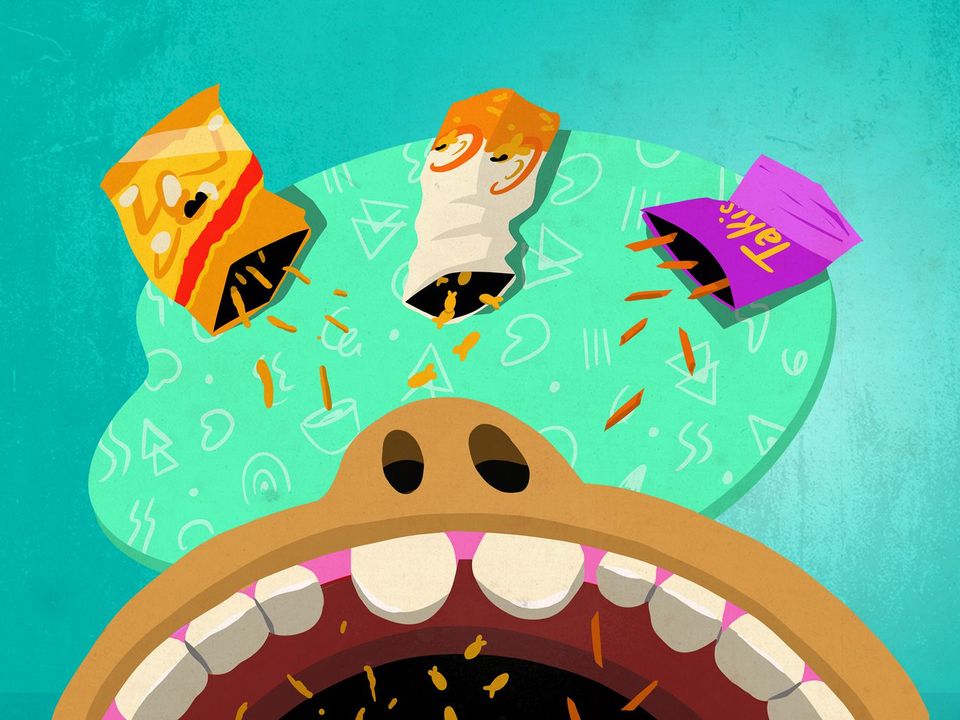8 Sneaky Eating Habits to Overcome

We've all been there – mindlessly munching on chips, snacking late at night, or skipping breakfast in the morning rush. These bad eating habits can creep up on us, leading to weight gain and an unhealthy relationship with food.
But fear not! In this article, I will provide practical strategies to help you break free. Get ready to embark on a journey of self-discovery and healthier eating habits!
👉Mindless Eating: The Sneaky Culprit
Did you know that the size of the plate or bowl you eat from can influence how much you consume without even realizing it? Research by food psychologist Brian Wansink reveals that larger containers lead to unknowingly eating more. By swapping out your dinner plate for a smaller one and avoiding eating straight from containers, you can regain control over your portion sizes and make mindful choices.
👉Nighttime Noshing: Breaking the Cycle
There's a popular belief that eating at night is detrimental to weight loss. While experts debate its validity, research on animals suggests that when we eat can impact weight gain. To curb nighttime snacking, think of your kitchen as closed for the night after dinner. Brushing your teeth can help reduce the temptation to eat, and if hunger persists, opt for a small, healthy snack like cheese or a piece of fruit.
👉Endless Snacking: Choosing Wisely
Snacking throughout the day, especially on high-calorie, empty-carb foods, can derail your weight loss efforts. The key is to surround yourself with healthy snack options. Keep hummus, carrots, cucumber slices, air-popped popcorn, yogurt, and almonds within easy reach. Avoid stocking your desk or pantry with tempting indulgences that you know you can't resist.
👉Emotional Eating: Finding Healthy Coping Mechanisms
Emotional eating is a common stumbling block on the path to weight loss. Instead of using food as a coping mechanism, discover alternative stress-busting strategies. Take a walk after a stressful day, call a supportive friend to vent, or engage in activities that keep you away from the kitchen. By addressing the underlying emotions without turning to food, you can break free from this unhealthy habit.
👉Eating Too Quickly: Slow Down and Savor
Wolfing down your meals prevents your brain from signaling fullness until it's too late. Japanese researchers discovered that eating too quickly was strongly associated with being overweight. To slow down your eating, put your fork down between bites, take smaller bites, and chew your food thoroughly. Drinking water throughout the meal will also help you feel fuller and more satisfied.
👉Not Getting Enough Sleep: A Weighty Consequence
Lack of sleep can sabotage your weight loss efforts. Research shows that those who sleep five hours or less a night are more likely to gain weight. Establish a sleep routine, aiming for seven to eight hours of quality sleep each night. Create a calming environment in your bedroom, avoiding electronics before bed. Remember, better sleep leads to better weight management.
👉Vegging Out with Screens: Beware of Screen Time
Sitting in front of a screen for extended periods can lead to mindless snacking and weight gain. Taking frequent breaks to move around can help combat this sedentary behavior. Set reminders to get up, stretch, and walk around every 15 to 30 minutes. When screen time ends, be mindful of your food choices to avoid overeating.
👉Eating Junk Food: Finding Balance
Junk food can be addictive, and eliminating it completely from your diet may backfire. Instead, learn to indulge in moderation and as an occasional treat. Identify your favorite indulgences and savor them mindfully, enjoying the experience without guilt. The key is finding a balance between nourishing your body with wholesome foods and treating yourself to small indulgences.
Breaking bad eating habits requires understanding our behaviors, making tangible changes, and harnessing the power of psychology. By incorporating the strategies discussed in this article, such as mindful eating, portion control, stress management, and developing healthy routines, you can regain control over your eating habits and achieve your weight loss goals.
Remember, change takes time and effort, but with determination and a positive mindset, you can transform your relationship with food and embrace a healthier lifestyle.